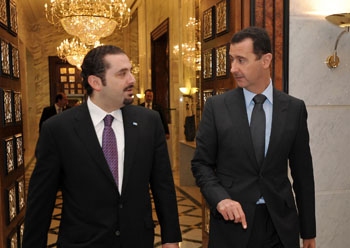Beirut – Christmas in Lebanon is quite a colourful occasion – at least far as the political parties are concerned. In addition …

The recent visit of Lebanon’s prime minister, Saad Hariri, to Syria could herald an improvement in ties between the two nations after almost five years of political wrangling, analysts say. The symbolism of the trip was particularly significant since Hariri had repeatedly accused Damascus of being responsible for the killing of his father, former premier Rafik Hariri, in February 2005. Hariri, who met the Syrian president Bashar al-Assad on December 20, described his visit to Damascus as “historic”. We want privileged, sincere and honest relationships [with Syria],” the prime minister said in a press conference in the Syrian capital at the end of his two-day trip, which came shortly after his newly-formed government won a vote of confidence in parliament. Analysts said that by visiting Damascus, Hariri was acknowledging a belief common in Lebanon that the country needed to maintain good relations with its larger neighbour to guarantee internal stability. “Syria is the key to stability and security in Lebanon,” said a Damascus-based political analyst, who spoke on condition of anonymity. He added that the Lebanese had realised in the past five years that their country couldn’t “live in peace while showing hostility towards Syria”.
Lebanon and Syria have turned one page but have they started a new one? Omayma Abdel-Latif reports from Beirut,
In February 2006, Mahdi Dakhallah, then Syrian minister of information and today serving as Syria's ambassador to Riyadh, spoke confidently of how Lebanese politicians spearheading a campaign against Syrian President Bashar Al-Assad would eventually struggle to mend fences with Damascus.
"We are used to Jumblatt's gimmicks," Dakhallah said, referring to Lebanese Druze leader Walid Jumblatt who orchestrated the March 14 campaign against Syria. "He will eventually want to come back to Damascus."
Anyone listening to Dakhlallah then could have been forgiven for thinking that like many Syrian politicians at the time he was in a state of denial about realities on the ground.
Al-Assad's regime was isolated regionally and internationally, and Syria had been branded a key actor in the so-called "axis of evil" by the US Bush administration. One of the goals of the so-called Lebanese Cedar Revolution was regime change in Syria, according to its main architect, Jumblatt.
The assassination of Lebanese politician Rafik Al-Hariri in February 2005 has also proved a crucial test for Al-Assad's regime, forcing it to make painful decisions, such as ending three decades of Syrian presence in Lebanon and withdrawing Syrian troops in April 2005.
In the years that followed, Damascus's policies towards Lebanon were improvised rather than chosen. Yet, despite its isolation the regime proved resilient. Al-Assad reconciled himself with the fact that Damascus would have to make tactical changes if it were to contain international pressure and regional isolation.
By Diana Mukkaled,
Khazen History


Historical Feature:
Churches and Monasteries of the Khazen family

St. Anthony of Padua Church in Ballouneh
Mar Abda Church in Bakaatit Kanaan
Saint Michael Church in Bkaatouta
Saint Therese Church in Qolayaat
Saint Simeon Stylites (مار سمعان العامودي) Church In Ajaltoun
Virgin Mary Church (سيدة المعونات) in Sheilé
Assumption of Mary Church in Ballouneh
1 - The sword of the Maronite Prince
2 - LES KHAZEN CONSULS DE FRANCE
3 - LES MARONITES & LES KHAZEN
4 - LES MAAN & LES KHAZEN
5 - ORIGINE DE LA FAMILLE
Population Movements to Keserwan - The Khazens and The Maans
ما جاء عن الثورة في المقاطعة الكسروانية
ثورة أهالي كسروان على المشايخ الخوازنة وأسبابها
Origins of the "Prince of Maronite" Title
Growing diversity: the Khazin sheiks and the clergy in the first decades of the 18th century
Historical Members:
Barbar Beik El Khazen [English]
Patriach Toubia Kaiss El Khazen(Biography & Life Part1 Part2) (Arabic)
Patriach Youssef Dargham El Khazen (Cont'd)
Cheikh Bishara Jafal El Khazen
Patriarch Youssef Raji El Khazen
The Martyrs Cheikh Philippe & Cheikh Farid El Khazen
Cheikh Nawfal El Khazen (Consul De France)
Cheikh Hossun El Khazen (Consul De France)
Cheikh Abou-Nawfal El Khazen (Consul De France)
Cheikh Francis Abee Nader & his son Yousef
Cheikh Abou-Kanso El Khazen (Consul De France)
Cheikh Abou Nader El Khazen
Cheikh Chafic El Khazen
Cheikh Keserwan El Khazen
Cheikh Serhal El Khazen [English]
Cheikh Rafiq El Khazen [English]
Cheikh Hanna El Khazen
Cheikha Arzi El Khazen
Marie El Khazen